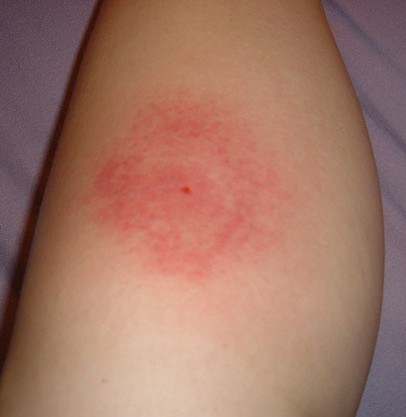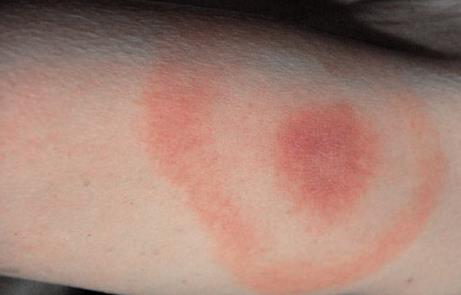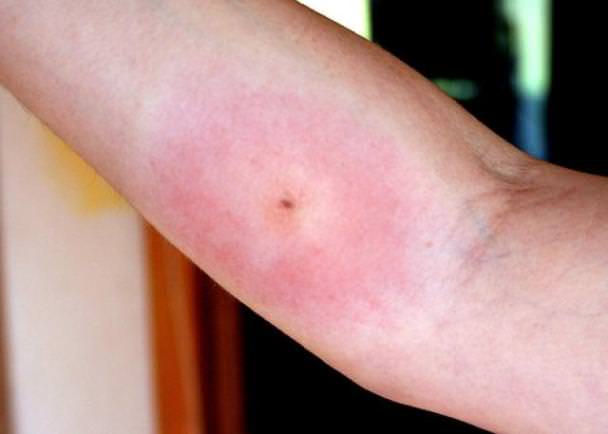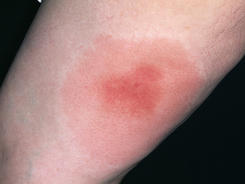For anybody that spends any time outdoors, bug bites and stings are commonplace. From ticks, spiders, bees, wasps, and ants, to mosquitos, bug bites and stings are the result of a feeding, or a defence mechanism. Fortunately, most bites and stings are usually just uncomfortable, and heal on their own. However, those people who are sensitive to bug bites, or have a bug bite with white ring around it, can have severe or even life threatening reactions.
What does Bug Bite with White Ring Around It Indicate?
Skin necrosis is a complication that results in the death of the skin tissue. The white ring around a bug bite are dead lymphocytes, or white blood cells that have sacrificed themselves rushing to the scene to kill off the toxic saliva from a bite or sting. What’s important to distinguish is whether the white ring is the result of a secondary infection, or from necrotic venom.
1. Insect Bites
All biting insects produce local reactions and produce an itchy welt that can last a few hours to a few days. However, with some bites a skin wound or ulcer may result, creating a white ring of dead skin tissue around the ulceration. More importantly, some arachnids, like ticks and mosquitos, may cause infection or transmit disease through their bites.
 Mosquito Bite
Mosquito Bite
Mosquito bites are the itchy welts that appear after they puncture your skin and feed on your blood. The bite-bump usually heals on its own in a couple of days. However, mosquitoes carrying certain viruses or parasites can also cause severe illness. Mosquito-borne infections include malaria, yellow fever, the Zika virus, and sometimes may cause a brain infection called encephalitis.
- Tick Bite
 Aside from the intense itching and resulting ulceration from a tick bite, Lyme disease is a major concern. Ticks infected with Lyme disease carry a microorganism (spirochete), that is injected when they bite causing an illness similar to the flu in humans that may become chronic. A tick bite that results with a welt surrounded by red rings that radiate outward (Bulls- Eye), is the hallmark of a Lyme disease infection.
Aside from the intense itching and resulting ulceration from a tick bite, Lyme disease is a major concern. Ticks infected with Lyme disease carry a microorganism (spirochete), that is injected when they bite causing an illness similar to the flu in humans that may become chronic. A tick bite that results with a welt surrounded by red rings that radiate outward (Bulls- Eye), is the hallmark of a Lyme disease infection.
2. Spider Bite
Although any spider bite can be painful, a secondary infection may lead to a white ring of dead skin cells around an open sore. What does a bug bite with white ring around it indicate? It could be a brown recluse spider bite. This is because the brown recluse spider injects a necrotic venom that leads to skin cell death. It’s important to note that with a brown recluse spider bite, the wound ulcerates into a larger wound that includes a centred blister surrounded first by a red ring and then by a white ring.
 Symptoms of an insect bite may include:
Symptoms of an insect bite may include:
- Deep blue or purple area around the bite, surrounded by white and red outer rings
- Burning, itching, pain or redness that may develop within hours or days
- Ulcer or blister that turns black
- Fever
- Rash
- Nausea or vomiting
3. Insect Stings
The one thing many people know about insect stings is that they can be painful. Many people are sometimes surprised by how much pain a sting can produce.
|
Bees, Wasps, or Hornets |
Bees, wasps and hornets can cause two reactions by their stings. The first most common reaction is to the venom from the sting. This typically includes localized intense pain, followed by redness and swelling at the sting site. Although uncomfortable, the pain and swelling diminishes over a couple of hours. However, for some people, this venom could trigger a life threatening reaction known as anaphylaxis (allergic reaction). If not treated immediately, the person could eventually go into anaphylactic shock resulting in death. |
|
Scorpions |
Scorpion stings can be painful, but most of them are harmless. However, some species can inflict potentially fatal stings. Stings are most serious with the elderly and in young children. |
|
Fire Ants |
Fire ants, imported from Mexico, deliver many bites that are painful and form ulcers at the sting site. Their venom also may cause serious and systemic reactions; however, death is very rare. |
 Symptoms of an insect sting may include:
Symptoms of an insect sting may include:
- Burning, and itching
- Redness, and swelling of the sting area
- Circular shaped white and red rings (bull's-eye)
- Ulcer or blister
- Hives
- Trouble breathing
- A weak and rapid pulse
- Nausea, or vomiting
- Dizziness or fainting
Treatments for Bug Bite with White Ring Around It
1. Insect Bites
Many common spider and insect bites may be simply treated at home. However, bites by a brown recluse spider or a black widow require immediate medical care.
- For black widow bites that are observed to be affecting a person's health, a vial or two of antivenin (equine) may be administered intravenously, which can save a life.
- For a brown recluse spider bite, medication, such as Dapsone, will stop the necrotic spread of lesions that develop into deep ulcerations.
2. Insect Stings
Identifying the insect can be a benefit when treating stings. Serious scorpion poisoning requires emergency treatment to support and monitor respiration, heart rhythm, and blood pressure. Commercially available antivenins are able to rapidly reverse much of the life threatening problems. Monitor for anaphylaxis, because it is a severe, potentially life-threatening allergic reaction.
3. Other Tips to Help
Fortunately, most insect bites and stings can be treated with a cold pack and pain medication. However, a bug bite with white ring around it indicates a more serious condition. If the bug bite or sting;
- Does not develop ulcers, treatment includes applying a cold pack while elevating and avoiding moving the bite area.
- Causes an ulcer and necrosis (white ring of dead skin), treatment includes removing the dead skin, and may require replacing the dead skin with skin grafts.
When You Should Worry about a Bug Bite
Get immediate medical attention if any of these conditions apply:
- Intense pain and stiffness
- Fever
- Chills
- Nausea
- Irregular heartbeat
- Rapid swelling of the eyes, lips, tongue, and throat
- Difficulty breathing
- Abdominal pain that develops a couple of hours after a spider bite
- Loss of consciousness
These are the signs of either anaphylactic shock (allergic reaction) or of a severe, non-allergic reaction to multiple stings.
